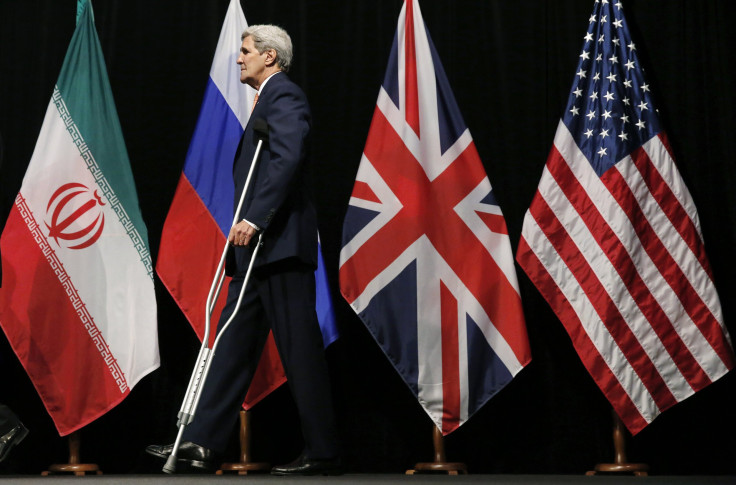Pundits React To Iran Deal With Skepticism, Citing Woody Allen And Doomsday Critics

Opinions exploded across the Internet Tuesday seemingly moments after the Iran nuclear deal was announced, with politicians and pundits alike debating the quality of the historic agreement and whether it could ensure nuclear peace. Under the deal brokered by the United States, United Kingdom, France, Russia, Germany and China, world powers agreed to lift sanctions against Iran in exchange for Tehran reducing its uranium stockpile by 98 percent. A roundup of reaction from some of the best-known writers and commentators with major U.S. news sources is below:
Peter Beinart of The Atlantic was fatalistic, comparing the decision Congress now faces to the line from a Woody Allen speech: “Mankind faces a crossroads. One path leads to despair and utter hopelessness. The other, to total extinction. Let us pray we have the wisdom to choose correctly.” Beinart went on to say that there are no good alternatives to the plan currently on the table and that the hard line critics are taking is ultimately not sustainable. "The United States cannot bludgeon Iran into total submission, either economically or militarily. The U.S. tried that in Iraq," he wrote. He argued for a more measured approach.
"I hope that Obama will study the reality of Iranian activity in the region and begin to push back against Iran’s ambitions with more alacrity than he has done so far," wrote Jeffrey Goldberg of the Atlantic. His article admitted the "practical necessity" of the Iran deal while insisting that the deal should only be the beginning of American diplomatic involvement in Iran. According to Goldberg, the U.S. needs to remain vigilant so that terrorist groups such as Hezbollah do not get their hands on the cash that could flow into Iran if sanctions are lifted.
Somewhat surprised the release of Americans held hostage in Iran wasn't part of this deal. Unless something is being sequenced.
— Jeffrey Goldberg (@JeffreyGoldberg) July 14, 2015David Makovsky and Matthew Levitt of Foreign Policy magazine urged a similar path in their article "Keeping Iran's Feet to the Fire." They highlighted the fact that, while Iranian sanctions and terrorist activity are not always linked, neither are they completely unrelated. Makovsky and Levitt seemed to fear that fighting Hezbollah would take a backseat if the Obama administration felt convinced that the nuclear deal would prevent terrorists from acquiring a nuclear weapon. The article called for skepticism on Iran's dedication to peace and argued for heightened attention to terrorist activities in regimes supported by Iran.
Thomas Friedman, a columnist at the New York Times, was far more damning of the terms of the deal and more doubtful that they would be followed by leaders in Iran. "It is stunning to me how well the Iranians, sitting alone on their side of the table, have played a weak hand," he wrote, adding: "When the time comes, I’m hiring [Ayatollah] Ali Khamenei to sell my house." Friedman cited Iran's laxness in agreeing to nuclear site inspections and their continuing secrecy as evidence supporting his belief that the deal would never be followed.
An immense, historic achievement for Americans, Iranians and world: Iran Nuclear Deal Reached After Long Negotiations http://t.co/Fd6lIgwczb
— Roger Cohen (@NYTimesCohen) July 14, 2015Roger Cohen of the New York Times urged restraint when leaping to judge President Barack Obama, Secretary of State John Kerry, or any of the other major orchestrators of the plan in his July 9 column entitled "Iran's Unserious Critics." He noted that since the Obama government began discussions with Iran concerning its stockpile, Tehran has made efforts to slow its construction of centrifuges. "It does not mean Iran is to be trusted," he wrote. "It does mean that hard-nosed agreements with Iran can stick and that Tehran must be taken seriously in its declared readiness to reach a fair deal." Cohen slammed "doomsday" critics -- including Republican members of Congress, as well as Israeli Prime Minister Benjamin Netanyahu, for criticizing the first solvent deal between Iran and Western countries.
© Copyright IBTimes 2025. All rights reserved.






















